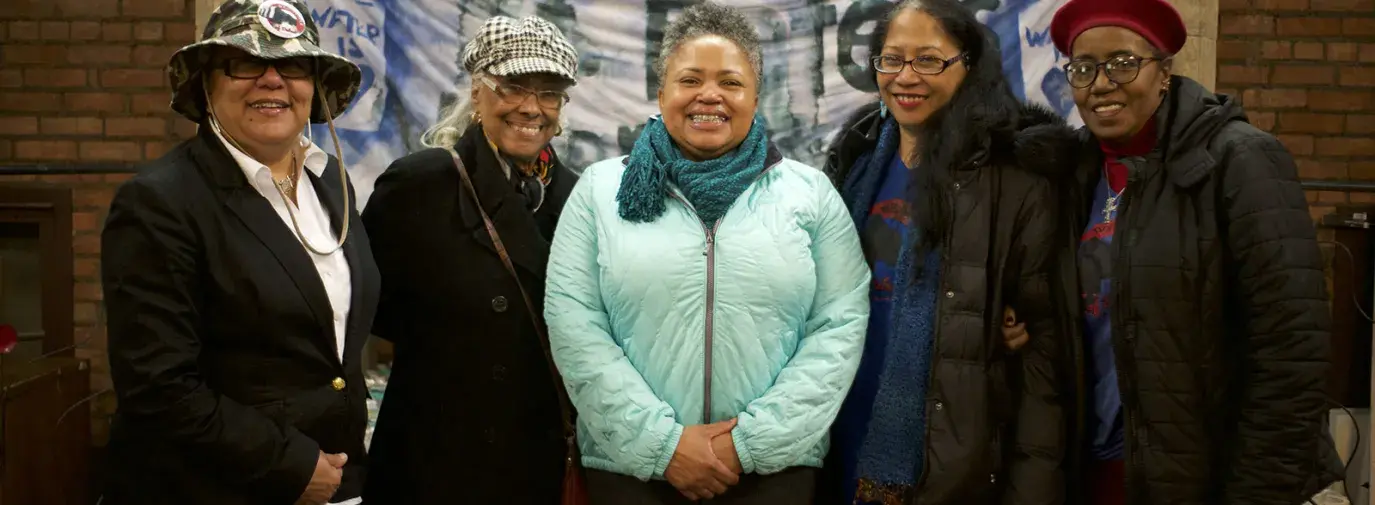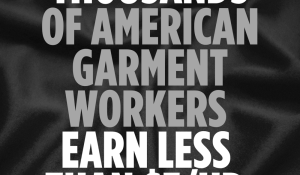
Photo caption: The board of We the People of Detroit, from left to right: Debra Taylor, Chris Griffith, Monica Lewis-Patrick, Aurora Harris, and Cecily McClellan. Courtesy of We the People of Detroit and the KIND Foundation.
They were a group of women who didn’t start out together as community organizers. In 2009, the state proposed that Detroit’s mayor assume control over Detroit public schools, in place of elected school committee members, which caused families to worry that the move could result in crippling budget cuts. People began attending city council meetings to speak out against the takeover. Monica Lewis-Patrick was one of them, and she soon got to know and started eating lunch with a group of parents and other concerned citizens.
The city council and the press assumed the new friends were part of an organization. A reporter covering the story went up to Debra Taylor, one of the friends, and asked, “Who are you?”
“Well, we’re the people of Detroit,” Taylor responded.
We the People of Detroit was born on that day, but the group has grown far past that one struggle. Lewis-Patrick is the CEO of We the People of Detroit, which now broadly advocates for human rights for Detroit’s most vulnerable populations. They’ve fought numerous austerity measures—which they said disproportionately affected low-income families—enacted by the government both before and since the city of Detroit’s declaration of bankruptcy in 2014. They also traveled to Flint to help organize citizens for clean water two years before that city made national news. Now, We the People is fighting its biggest and longest battle yet: ensuring that Detroiters have fair, equitable, and uninterrupted access to clean water.
Water, Water Everywhere, but Not a Drop to Drink
The city’s water system supplies drinking water to nearly 3.8 million people in the suburbs of Detroit, which it sources from Lake Huron.
When Michigan declared bankruptcy on behalf of Detroit in 2014, nearly a third of its debt was $5.7 billion owed to the city by its own water department. At that point, the department began shutting off water for residents who were more than $150 behind on their water bills. The cost of water had risen about 96 percent in eight years prior to 2014 (it’s now up 120 percent since 2007). The average Detroiter was paying 20 percent of their pretax income on water, whereas the EPA recommends water costs should be around 2.5 percent of household income.
“It is contrary to human rights to disconnect water from people who simply do not have the means to pay their bills.” —Catrina de Albuquerque, UN special rapporteur
As a result, tens of thousands of homes in the city had their water shut off over inability to pay their water bills. These families also lived under the threat of a visit by social services, because the agency can take children out of homes that don’t have water for more than 72 hours, and the city can seize the homes where this is the case.
Lewis-Patrick says the shutoffs are an affront to health, safety, and the poor, who were expected to pay water bills that could have been a quarter of their take home pay, while commercial buildings downtown were allowed to let their water bills pile up. Al Jazeera reported in October 2014 that commercial and industrial users had racked up $30 million in unpaid water bills, including the Detroit Lions’ stadium, which owed the city $55,000. Lewis-Patrick says those debts are still unpaid and likely growing.
“Many of the wealthy leaders were allowed to renegotiate [or have] millions of dollars of debt [forgiven], but then the rest of the debt for the water system has been laid on the backs of retirees, pensioners, and low-income people,” Lewis-Patrick says.
So We the People of Detroit took on the water utility and the city of Detroit. The group documents water shut-offs and manages a water relief hotline, which helps affected people access water. In 2016, it delivered 125 tons of bottled water to citizens.
It also puts pressure on the government by bringing national and international eyes to the situation. In 2014, United Nations special rapporteurs on the rights to water, sanitation, and affordable housing visited the city. We the People of Detroit staff showed them around and introduced them to residents.
“I heard testimonies from poor, African-American residents of Detroit who were forced to make impossible choices—to pay the water bill or to pay their rent,” Catarina de Albuquerque, one of those special rapporteurs, said in a press release. “It is contrary to human rights to disconnect water from people who simply do not have the means to pay their bills.”
The UN provided a report about to the State Department, Detroit’s mayor, and the governor of Michigan and went on the UN record, but nothing really changed, says Lewis-Patrick.
Overburdening Low-Income Families
In July, the city announced water prices would be going up an average of 4.5 percent, due to a 0.3 percent drop in water usage. Meanwhile, the high price of water has exacerbated already dire conditions for Detroit homeowners. In 2015, banks foreclosed on 14,000 homes just based on water debt.
In addition, over 100,000 homeowners faced foreclosure because of illegal tax assessment, which stole wealth from families and made them more vulnerable to water shutoffs. A 2016 study from professors at Wayne State and Oakland Universities shows that from 2009 to 2015, the city assessed homes at much higher prices than their actual worth—resulting in higher property tax bills than warranted—and then foreclosed on the homes when residents couldn’t pay those taxes. In a time when property values were plummeting in the city, the study noted, the property tax bills often exceeded the market value of the entire home.
Low- and middle-income Detroiters were also particularly hard-hit by the predatory subprime mortgages that led to the 2008 housing market crash and recession. Black customers looking for loans in Detroit were 70 percent more likely to get a high-risk subprime loan than white borrowers with similar financial characteristics, according the ACLU. Subprime loans often have predatory terms, such as ballooning interest rates or high fees. The ACLU has an ongoing suit against Morgan Stanley for its role in shaping the high-risk predatory loans that contributed to the foreclosure crisis in Detroit, on behalf of five Black families.
“Between predatory-lending practices being imposed on Detroiters, along with [too-high property taxes due to] illegal and unconstitutional assessment, and then you compound that with unaffordable water for a city that’s about 40 percent living in poverty, it doesn’t take much—one child getting sick, a flat tire or car repair, or any of those basic life situations—to force people into an
insecure situation as it relates to their water,” says Lewis-Patrick.
Bring the Press, Researchers, Everyone
The shutoffs are still ongoing, but Lewis-Patrick calls the progress made in the last three years by We the People of Detroit in coalitional action with other organizations and thousands of volunteers “tremendous.” However, she says, the organization is no replacement for a working, affordable water utility.
“There’s a big difference between affordability and assistance," says Nadia Gaber, a researcher who has worked with We the People of Detroit. "And the [Detroit Water and Sewerage] department has been working on an assistance model that economists like Roger Colton have shown won’t get people the water they need. [And they] deserve to live a dignified life.”
The group has brought attention to its cause by making collaborative agreements with researchers like Gaber at 13 universities who study water, public health, and public policy. From 2014 to 2016, We the People of Detroit, in coalition with the Detroit People’s Water Board and other groups, trained community members on data collection for these researchers, and they began a citizen science project that included a survey of over 500 Detroit residents experiencing water shutoffs. Researchers were looking for connections between shutoffs, race, and water-related illnesses.
That two-year project culminated in a book released last summer called Mapping the Water Crisis: The Dismantling of African-American Neighborhoods in Detroit, which Lewis-Patrick says is being studied in classrooms from middle school to college.
“What we know based on a study from Michigan State from early February is that 36 percent of America will not be able to afford their water over the next five years,” says Lewis-Patrick. “Even though the national narrative is that Black folks in Detroit just don’t want to pay their fair share, this is really not about racializing a group of people in Detroit. This is about a systemic issue that the country is facing.”
Meanwhile, We the People of Detroit will continue to empower and amplify the voices of the poorest communities in their city, who historically have the least power. Lewis-Patrick says she’s proud of her community and those who have come from afar to help protect it: “I love ... when you see Detroiters running water hoses from house to house, to ensure that if their neighbor has been cut off, they still have access to this life-renewing source called water. Detroit is what we’re uplifting and Detroit is synonymous with all the struggles that are happening around the globe.”







